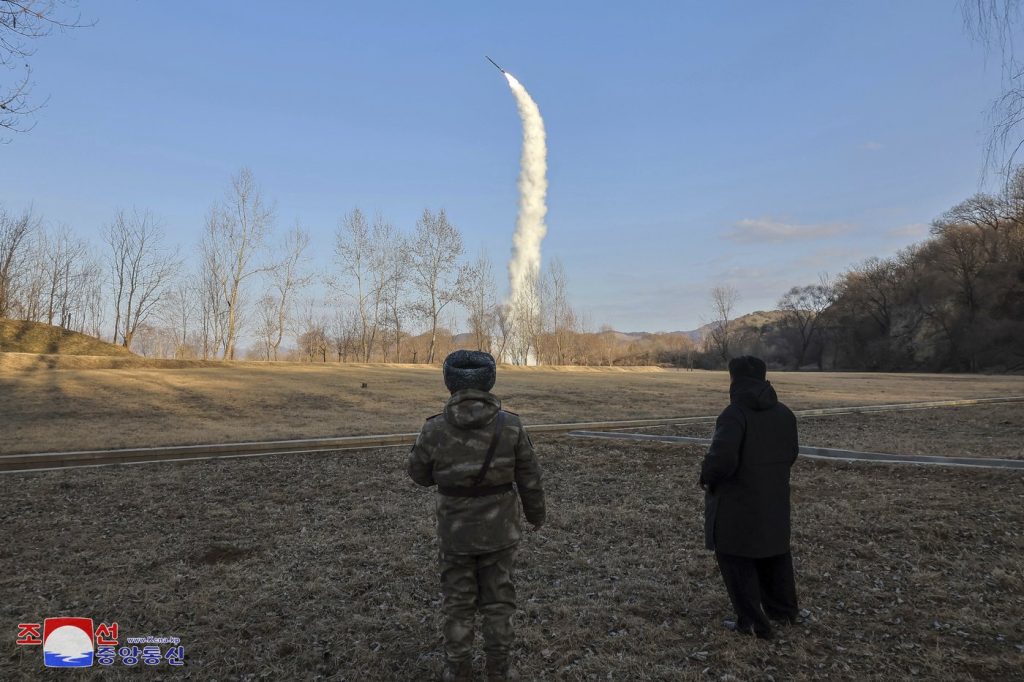SEOUL, South Korea (AP) – North Korea announced on Sunday that it successfully tested a cruise missile system, marking the third known weapons display of the year. The North Korean government emphasized its commitment to adopting "the toughest" response against perceived escalations from U.S. and South Korean military drills, which it views as provocations targeted at the North.
The recent missile test indicates that North Korea will continue its series of weapons testing and adopt a confrontational stance toward the United States, despite President Donald Trump expressing his intention to reach out to North Korean leader Kim Jong Un. According to the Korean Central News Agency (KCNA), Kim observed the test of the sea-to-surface strategic cruise guided weapons on Saturday.
Notably, the term "strategic" refers to the missiles' potential nuclear capabilities. KCNA reported that the missiles traveled elliptical and figure-eight-shaped flight patterns over a distance of 1,500 kilometers (932 miles) before hitting their designated targets, although this claim could not be independently validated. Kim stressed that North Korea's war deterrence abilities are being refined and indicated that the nation would exert "strenuous efforts" to enhance its military strength to sustain stability.
In a statement from South Korea's Joint Chiefs of Staff, it was reported that North Korea launched several cruise missiles from an inland area toward its western waters around 4 p.m. on Saturday. They reaffirmed South Korea's readiness to "overwhelmingly" counter any provocations in collaboration with its ally, the United States.
In a separate announcement, North Korea's Foreign Ministry criticized the U.S. for what it described as "serious military provocations" stemming from a series of military exercises with South Korea this month. The statement argued that the Democratic People's Republic of Korea (DPRK) should respond to U.S. actions with the "toughest counteraction from A to Z," as long as the U.S. continues to disregard North Korean sovereignty and security interests.
The Foreign Ministry's warning aligns with Kim's previous commitments to implement a "toughest" anti-U.S. policy made during a year-end political gathering. North Korea perceives the U.S.-South Korea military training as rehearsal for invasion, whereas Washington and Seoul claim that their exercises are purely defensive. In recent years, the U.S. and South Korea have expanded their military exercises in response to North Korea's advancing nuclear capabilities.
With Donald Trump's second term beginning, there is hope for renewed diplomacy between the U.S. and North Korea. Trump previously engaged in three summits with Kim during his first term. However, negotiations broke down over disputes regarding U.S.-led economic sanctions on North Korea.
In a recent Fox News interview, Trump referred to Kim as a “smart guy” and indicated that he would consider reaching out to him once again. Many experts suggest that Kim may believe he possesses greater negotiating leverage than before, owing to North Korea's expanded nuclear arsenal and growing military association with Russia.
Concerns persist in South Korea that Trump may reduce military exercises with its regional ally or abandon the goal of complete denuclearization of North Korea, potentially focusing instead on eliminating long-range missile threats to the U.S., while leaving nuclear capabilities against South Korea unaddressed.
During a news conference in the Oval Office after his inauguration, Trump described North Korea as "a nuclear power,” a statement that raised eyebrows, as Washington and its allies have traditionally avoided acknowledging North Korea as a nuclear state due to the implications regarding its provocative pursuit of nuclear weapons.
Following his first summit with Kim in 2018, Trump notably stunned many South Koreans by unilaterally announcing the suspension of large-scale summertime military drills, deeming them "very provocative" and "tremendously expensive." Despite Trump’s overtures, North Korea has yet to comment on the latest developments, which include the cruise missile tests – the first known weapons launch since his inauguration.










